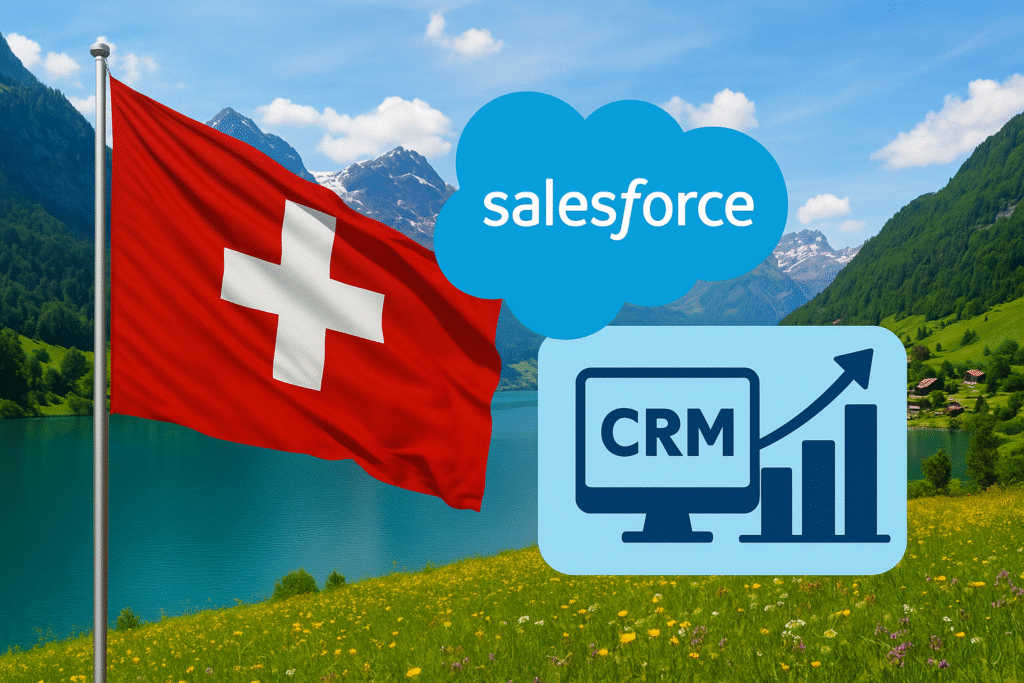Salesforce in Switzerland: CRM Insights and Job Outlook 2025-26

Introduction: Salesforce in Switzerland
Salesforce, the global leader in Customer Relationship Management (CRM) solutions, continues to expand its influence in Switzerland. As businesses increasingly prioritize digital transformation, Salesforce’s cloud-based CRM platform has become indispensable for enterprises across industries, including finance, healthcare, pharmaceuticals, and retail.
This blog explores the current state of Salesforce adoption in Switzerland, key CRM trends shaping 2025-26, and the evolving job market for Salesforce professionals.
Table of Contents
1. Salesforce Adoption in Switzerland
Switzerland, known for its strong economy and innovation-driven enterprises, has embraced Salesforce as a key enabler of customer engagement, sales automation, and data-driven decision-making.
Key Industries Leveraging Salesforce
1. Banking & Finance
- Swiss banks and financial institutions use Salesforce for client relationship management, compliance tracking, and personalized financial services.
- Companies like UBS and Credit Suisse leverage Salesforce Financial Services Cloud for secure, scalable CRM solutions.
2. Pharmaceuticals & Life Sciences
- Switzerland’s thriving pharmaceutical sector (Novartis, Roche) relies on Salesforce Health Cloud for patient engagement, clinical trial management, and regulatory compliance.
3. Retail & Luxury Goods
- High-end brands like Rolex and Swatch use Salesforce Commerce Cloud and Marketing Cloud to enhance customer experiences through AI-driven personalization.
4. Manufacturing & Industrial Sector
- Companies such as ABB and Nestlé utilize Salesforce for supply chain optimization, B2B sales, and IoT-integrated CRM solutions.
Factors Driving Salesforce Growth in Switzerland
- Digital Transformation: Swiss businesses are accelerating cloud adoption to stay competitive.
- AI & Automation: Salesforce Einstein AI is being widely adopted for predictive analytics and chatbots.
- Data Privacy & Compliance: Salesforce’s strong security measures align with Switzerland’s strict data protection laws (FADP, GDPR).
2. CRM Trends in Switzerland (2025-26)
As businesses evolve, CRM strategies are becoming more sophisticated. Here are the top Salesforce CRM trends shaping Switzerland in 2025-26:
A. Hyper-Personalization with AI
- Salesforce Einstein AI enables Swiss companies to deliver hyper-personalized customer experiences by analyzing behavior, purchase history, and engagement patterns.
- Example: Swiss luxury brands use AI-powered recommendations to enhance customer loyalty.
B. Integration of IoT & CRM
- Manufacturing and logistics firms integrate Salesforce with IoT devices for real-time tracking, predictive maintenance, and automated customer service.
C. Rise of Salesforce CDP (Customer Data Platform)
- Companies are consolidating customer data from multiple sources into Salesforce CDP for a unified customer view, improving marketing and sales alignment.
D. Sustainability & ESG Tracking in CRM
- Swiss firms are leveraging Salesforce Sustainability Cloud to track ESG (Environmental, Social, and Governance) metrics, aligning with Switzerland’s sustainability goals.
E. Increased Use of Low-Code/No-Code Tools
- Salesforce Lightning and MuleSoft enable Swiss businesses to build custom CRM solutions without extensive coding, accelerating digital transformation.
3. Salesforce Job Market Outlook (2025-26)
Switzerland’s demand for Salesforce professionals is surging, driven by digital transformation and cloud adoption.
A. Most In-Demand Salesforce Roles
1. Salesforce Administrators
- Responsible for CRM customization, user management, and reporting.
- Average Salary: CHF 95,000 – 120,000 per year.
2. Salesforce Developers
- Specialize in Apex, Lightning Web Components, and integrations.
- Average Salary: CHF 110,000 – 140,000 per year.
3. Salesforce Consultants
- Help businesses implement and optimize Salesforce solutions.
- Average Salary: CHF 100,000 – 130,000 per year.
4. Salesforce Architects
- Design scalable Salesforce solutions for enterprises.
- Average Salary: CHF 130,000 – 160,000 per year.
5. Marketing Cloud Specialists
- Focus on email automation, customer journeys, and analytics.
- Average Salary: CHF 105,000 – 135,000 per year.
B. Key Skills Employers Seek
- Technical Skills: Apex, LWC, Salesforce Flow, MuleSoft, CPQ.
- Soft Skills: Problem-solving, stakeholder management, business analysis.
- Certifications: Salesforce Administrator, Platform Developer, Sales/Service Cloud Consultant.
C. Hiring Trends
- Remote & Hybrid Work: Many Swiss companies offer flexible work arrangements for Salesforce roles.
- Freelancing & Contracting: High demand for independent Salesforce consultants.
- Upskilling Initiatives: Companies invest in training programs to bridge the skills gap.
4. Challenges & Opportunities
A. Challenges
- Talent Shortage: High demand but limited certified professionals.
- Cost of Implementation: SMEs may find Salesforce licensing expensive.
- Data Security Concerns: Strict Swiss regulations require careful CRM governance.
B. Opportunities
- Growing Startup Ecosystem: Swiss startups are adopting Salesforce for scalability.
- Government & Public Sector Adoption: Increased use of Salesforce for citizen services.
- AI & Automation Expansion: More businesses will leverage AI-driven CRM features.
5. How to Start a Salesforce Career in Switzerland (2025-26)
A. Get Certified
- Start with Salesforce Administrator or Platform App Builder certifications.
- Advanced roles may require Developer, Architect, or Consultant certifications.
B. Gain Practical Experience
- Work on Trailhead projects, volunteer for non-profits, or take internships.
C. Network in the Swiss Salesforce Community
- Join Zurich or Geneva Salesforce User Groups, attend events like Dreamforce or TrailblazerDX.
D. Apply for Jobs Strategically
- Target industries like finance, pharma, and retail where Salesforce adoption is high.
Conclusion
Salesforce continues to be a game-changer for Swiss businesses, driving innovation in CRM, AI, and automation. The job market for Salesforce professionals is booming, with lucrative opportunities across administration, development, consulting, and architecture. For businesses, investing in Salesforce means staying ahead in customer engagement and operational efficiency. For job seekers, acquiring Salesforce skills opens doors to high-paying roles in Switzerland’s tech-driven economy.

